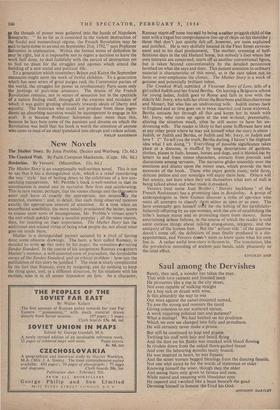New Novels
The Mather Story is an exceptionally well-written novel. This is not to say that it has a distinguished style, which is a relief considering the way ' style ' has of boiling down to the exhibition of a few eye- catching mannerisms. Mr. Prebble's book is well-written in that its construction is sound and its narrative flow firm and accelerating. This in turn means, perhaps, that the scenes change and the clArraeters enter and leave at exactly the appropriate, not necessdilly the expected, moment ; and, in detail, that each thing observed receives exactly the appropriate amount of attention. At a time when an exaceitated sensibility, the more noisily proclaimed the better, seems to excuse most sorts of incompetence, Mr. Prebble's virtues aren't the sort which quickly make a novelist popular ; all the more reason, then, for insisting on their importance. The Mather Story has the additional and related virtue of being what people do, not about what goes on inside them. • Mather is a distinguished painter accused by a rival of having done some obscene drawings. The hero, a Scot called Ramsay, is detailed to write up this story by his paper, the sensation-purveying Sunday Standard. In the course of his assignment Ramsay encgunters Mather's mistress, a well-assorted crew of journalists, the forMidable owner of the Sunday Standard, and an ethical problem : how can the publication of this story be justified ? The issue is nicely complicated by the fact that Ramsay, even by resigning, can do nothing to keep the thing quiet, and, in a different direction, by his relations with his mothr, who is in all senses dependent on him. As a character, Ramsay starts off none too well by being a rather priggish child of the mist with a vague but comprehensive line-up of chips on his shoulder ; those that don't just quietly fall off, however, are soon explained and justified. He is very skilfully located in the Fleet Street environ- ment and in his dual predicament. The mother, crooning of half- fictitious days in the old Hieland home, but nobody's fool where her own interests are concerned, starts off as another conventional figure, but is taken beyond conventionality by the detailed persistence lavished on what she says and does. This patient attention to ordinary material is characteristic of this novel, as is the care taken not ,to ' force or over-emphasise the climax. The Mather Story is a work of genuine and potentially brilliant talent.
The Crooked Wall, subtitled A Victorian Story of Love, tells of a girl called Judith and her friend Bertha. On leaving a Belgravia school for young ladies, Judith goes to Rome and falls in love with the elderly Mr. Ivery, who tells her about the Bourbons and likes chartreuse and Mozart, but who has an undivorcing wife. Judith comes back to England and as time goes on is twice married and twice widowed. Bertha sustains her through all this and keeps her in touch with Mr. Ivery, who turns up again at the end without, presumably, altering the situation much, since he still seems to have his un- divorcing wife. The reader is likely to feel some bafflement here and at any other point where he may ask himself what the story is about : Judith, or Judith and Bertha, or Judith and Mr. Ivery, or Judith and love ? (" To tell you the truth, Bertha darling, I haven't the slightest idea what I am doing.") Everything of possible significance takes place at a distance, is muffled by long descriptions of gardens, clothes, places in Italy, houses, horses and dogs, and is blotted out by letters to and from minor characters, extracts from journals and discussions among servants. The narrative glides smoothly over the emotions and dilates upon the minor ones, which provide the best moments of the book. Those who enjoy gentle irony, mild farce, delicate pathos and coy nostalgia will enjoy them here. Others will feel uneasy, not least when they ask themselves what sort of wall is being talked about and what made it crooked.
Vercors (real name Jean Bruller ; literary backbone ' of the French Resistance) has a promising idea in Borderline. A group of anthropologists in New Guinea discover a tribe of ape-men who resist all attempts to classify them either as apes or as men. The hero eventually gets himself tried for the killing of his (artificially- fathered) offspring by an ape-woman, with the aim of establishing the tribe's human status and so protecting them from slavery. Some entertaining debate follows, in the course of which the reader is told some curious things about talking orang-utans, telegony, and the antiquity of the human foot. But the set lous side ' of the question doesn't come off, the definition of man finally produced is a dis- appointment, and Vercors doesn't seem to know quite what his own line is. A rather awful love-story is thrown in. The translation, like the pre-electric recording of ancient jazz bands, adds pleasantly to the total effect.
KINGSLEY AMIS


































 Previous page
Previous page